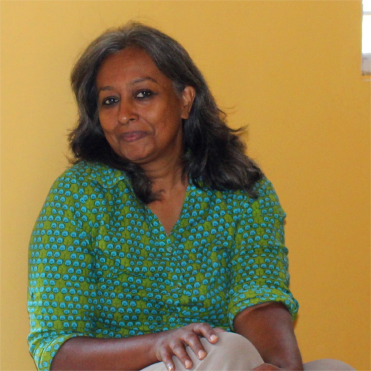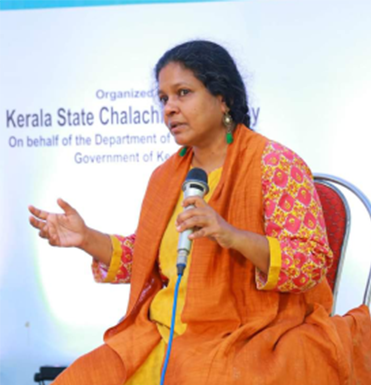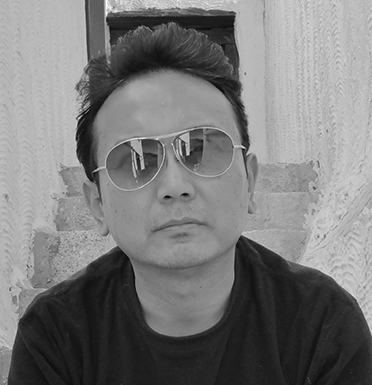A SOUTH ASIAN
film festival
Film southasia 2024
starts april
Kathmandu | 3 locations | 7 days
Film Southasia 2022 was held in from April 21 to April 24 in Kathmandu, Nepal. The 13th iteration of the biennial festival of Southasian documentaries also marked the 25th year of the festival’s existence. The festival took place at Yala Maya Kendra and Patan Higher Secondary School Auditorium in Patan Dhoka, Lalitpur. Film Southasia ‘22 featured 71 films from eight countries, six engaging and topical panel discussions, and an exhibition – Create, Collaborate, Catalyze: Reflections on Sexual Violence in South Asia.
Jury

Ayisha Abraham
Ayisha Abraham is a Bangalore-based installation artist and short filmmaker. She is a visual arts consultant at the Srishti Institute of Art, Design, Technology, Bangalore. She has exhibited her work widely in India and abroad. She has been interested in amateur film makers and in collecting 8mm home movies. Her short films with the found footage that she digitises and reedits include: Enroute (2011), I Saw a God Dance (2012) and Through a Dark Mine (2013).

Sumathy Sivamohan
Sumathy Sivamohan is Professor of English at the University of Peradeniya, Sri Lanka and an award winning filmmaker, theatre artist and performer. Her films Here and Now and Sons and Fathers have been screened widely. Two of her plays won the Gratiaen award for Literature in English for 2001. In 2011, she was awarded the Premchand Fellowship by the Sahitya Akademi of India.

Tsering Rhitar Sherpa
Tsering Rhitar Sherpa is a Nepali filmmaker, screenwriter and producer. Tsering studied Mass Communication at the Jamia Millia Islamia in Delhi. His 1997 film The Spirit Doesn’t Come Anymore, a documentary film profiling an old Tibetan shaman earned him the Best Film Award in Film Southasia 1997. Tsering has since made multiple feature films, Mukundo (2000), Karma (2006) and has produced other pathbreaking Nepali films such as Kalo Pothi (2015) and Seto Surya (2016).
Jury Statement
Film Southasia 2022
Closing Ceremony – 24 April, 2022
Possibly the only thing harder than making a documentary is to select the few best ones when all of the 62 films in the competitive section screened here over the past few days were of such high calibre.
The documentary genre evolved as a way to use the powerful tool of audiovisual medium to explore, explain and expose facets of modern society that are largely missed out by fictional cinema, or mainstream journalism.
In the post-truth, alternative-fact age that we live in, the documentary film dares to dig deep to bring out realities that are either ignored or glossed over.
Documentary film-makers are driven by the need to shine the light at the dark, hidden corners of our societies so that we can see, hear and act on the concerns of people and places in the periphery.
All the documentary films that we have carefully watched over the past months for this festival do exactly that. They force us to listen to the feeble, and see those in the shadows.
At a time when democracy, freedom of expression, pluralism, inclusiveness and non-violence, are all under threat from elected demagogues in the region and beyond, the work of these courageous documentary makers is more important than ever. That is why we must celebrate the documentary.
Over the past week, we in the jury have agonised over the short list, and the short-short list, and then the short-short-short list, watching many of the films several times. We have looked at their persuasive power, technical quality, messaging and relevance. We wish there were prizes for all of them.
The award for the Best Student Film goes to a journey into the lives of musician of a dying folk form that has been critical to a culture but has also been a vehicle for the dissemination of news in an era before the digital age.
The award goes to Gaine by Pradeep Dhakal
The award for the Best Film on Children’s Issues goes to a film which, with humour and lightness, provides a window into how children and families adapted to the sudden descent of a pandemic on an already difficult reality of juggling the combined challenge of work and home of an ordinary family. The award goes to Mahalle’s School – Family Going Live by Akshay Pradip Ingle
The Tareque Masud Award for Best Debut Film is shared by two films that closely observe an individual and a community confronted with challenges of our contemporary reality, be it livelihood or ecological, social or political circumstance. Each with its distinctive voice chronicles an everyday reality of survival, resilience and hope. The awards go to Into the Sea by Ashish Kumar Nayak and Gurkha Girl by Bishal Roka Magar
The jury award goes to a film that experiments poetically, intertextually and viscerally, with form in a story of pertinent realities in the way people and landscape, tradition and modernity can be seen and understood. The award goes to The Big Headed Boy, Shamans and Samurais by Bibhusan Basnet and Pooja Gurung
The Ram Bahadur Trophy goes to a film that expands beyond borders and boundaries, literally and conceptually, moving from the personal to the political in this private quest for answers to a fractured past. This poignant film pans out from an individual’s life, making powerful connections to a larger historical narrative, a process in which a history of loss, home, fraught relationships and identity at large continue to cast a dark shadow on the present realities of the subcontinent. The award goes to Longing by Bani Singh
